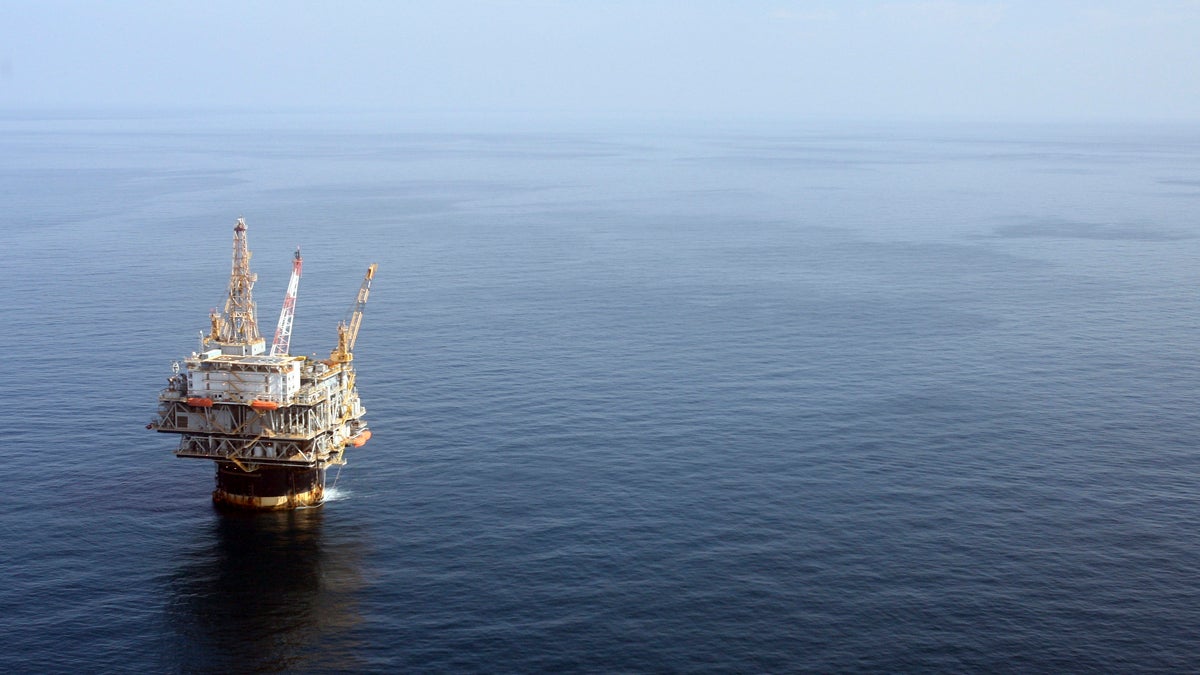Most Congressional lawmakers still question Trump administration plan of Atlantic coast oil drilling
Congressional lawmakers throughout the mid-Atlantic region are voicing their opinion to a plan to revisit oil exploration off the Atlantic coastline.
Listen 4:11
In January, U.S. Interior Secretary Ryan Zinke announced plans to expand possible offshore drilling sites in federal waters including nine sites in the Atlantic region. (AP file)
Congressional lawmakers throughout the mid-Atlantic region are voicing their opinion to a plan to revisit oil exploration off the Atlantic coastline.
U.S. Department of the Interior Secretary Ryan Zinke has come under fire from lawmakers up and down the East Coast who oppose his plan to allow oil and gas drilling in the Atlantic Ocean. But their anger turned to outrage when Florida was given a waiver that blocks drilling off that state’s shores.
Seeing the plan as a risk to fishing and tourism industries, South Jersey Congressman Frank LoBiondo — and most of his Republican colleagues from the East Coast — oppose the effort.
“A lot of the reasons if it’s bad for Florida, it’s bad for us. So if it Florida can get an exemption, why can’t states that are so adamantly opposed to it continue to have the exemption?” LoBiondo said.
Though he’s retiring after this year, LoBiondo said he’s prepared to fight the Trump administration tooth and nail while still in office.
“We’re going to ramp up our efforts. I’m asking for one of the hearings to be in Cape May County, so there can be direct testimony about the potential damage that something like that would cause,” he said. “And we’ll have to work through the system that Florida didn’t have to.”
Zinke reversed course for Florida after meeting with the state’s GOP Gov. Rick Scott who is expected to run for Senate later this year.
U.S. Sen. Bob Menendez, a New Jersey Democrat, said that doesn’t pass the political smell test.
“If it’s just because the state asked, well, New Jersey is asking. And unless you give it to New Jersey — and any other state that’s asking — then it’s purely political and on the basis of Governor Scott asking,” he said. “And I certainly don’t believe that we run policy by blue or red states.”
A bipartisan group of lawmakers and interested parties is also planning to fight the proposal in court.
“We will challenge things that President Obama currently took off under the Outer Continental Shelf Act, and we will use every legal means,” Menendez said, adding that newly inaugurated Gov. Phil Murphy “is fully on board with us.”
But a few Republicans from coastal states are eager for offshore drilling. Congressman Morgan Griffith, who represents Virginia coal country, said coastal state lawmakers would be foolish to try to block drilling.
“I’ve always been for it. We believe we have a big pool of natural gas out there. We need to get out there and explore,” Griffith said. “Everybody worries about oil, but the real riches are in natural gas.”
The Republican who represents Maryland’s Eastern Shore — including the Chesapeake Bay and Ocean City — said he’s open to drilling, under the right circumstances.
“First of all it can’t be in sight of the shoreline. I feel the same way with wind projects,” said Congressman Andy Harris. “If it can be further off shore, and they can convince me it can be done safely, and the communities that would be affected agree to it, I’m not an opponent.”
He denied the administration played politics with Florida’s exemption.
“Look, that’s consistent with my position: The neighboring community — in this case the state of Florida — has to agree to it. If they don’t agree with it, then the federal government shouldn’t force it on them,” Harris said. “That’s not my position. It’s whatever the community’s position is.”
But most Republicans from the Delaware Valley region don’t want to put the tourism industry at risk from a spill, especially because the oil and gas drilling industry is going strong on shore.
“Even from the most purely practical sense — and not even dealing with any sort of environmental considerations — we don’t need it,” said U.S. Rep. Ryan Costello, who represents parts of several counties west of Philadelphia.
The U.S. energy industry will continue to be dominant for the foreseeable future, he said, even without coastal drilling.
Already presented to Delaware residents, the Trump administration’s draft proposal will have a hearing in New Jersey in February. The public comment period officially ends in March.
WHYY is your source for fact-based, in-depth journalism and information. As a nonprofit organization, we rely on financial support from readers like you. Please give today.





